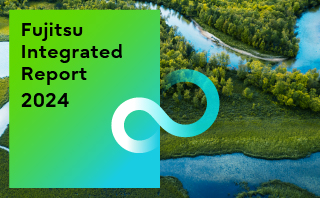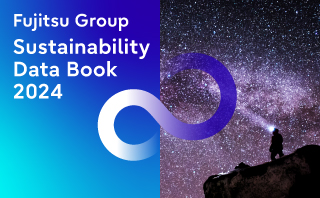-
Sustainability at Fujitsu Group
- Sustainability Management in the Fujitsu Group
- GRB(Global Responsible Business)Goals for FY2025
- GRB(Global Responsible Business)Goals and Achievments for FY2022
- Fujitsu's accessibility
- Stakeholder Engagement
- United Nations Global Compact
- SDG-related Activities in Fujitsu
- External Recognition and Awards
-
Global Responsible Business
- Environment
-
- Environmental Management
- The Fujitsu Group Environmental Vision on Climate Change
- Living in Harmony with Nature (Conservation of Biodiversity)
- Environmental Action Plan
- Environmental Data
- Environmental Communication
- Environmental Social Activities
- Disposal and Recycling of ICT products
- Environmental Considerations in ICT Products
- Governance
-
Data and Documents
- Fujitsu Group Sustainability Data Book 2024
- Social, Governance and Environmental data
- Independent Assurance Report

- GRI Standards / United Nations Global Compact (UNGC) principles Comparison Table
- SASB Standards Comparison Table
- Sustainability Information Disclosure Framework
- Link to regions responsible business reports
- Contact
- Sitemap
Financial Well-being
Performance Evaluation and Compensation
Personnel Handling based on Position-based HR Management
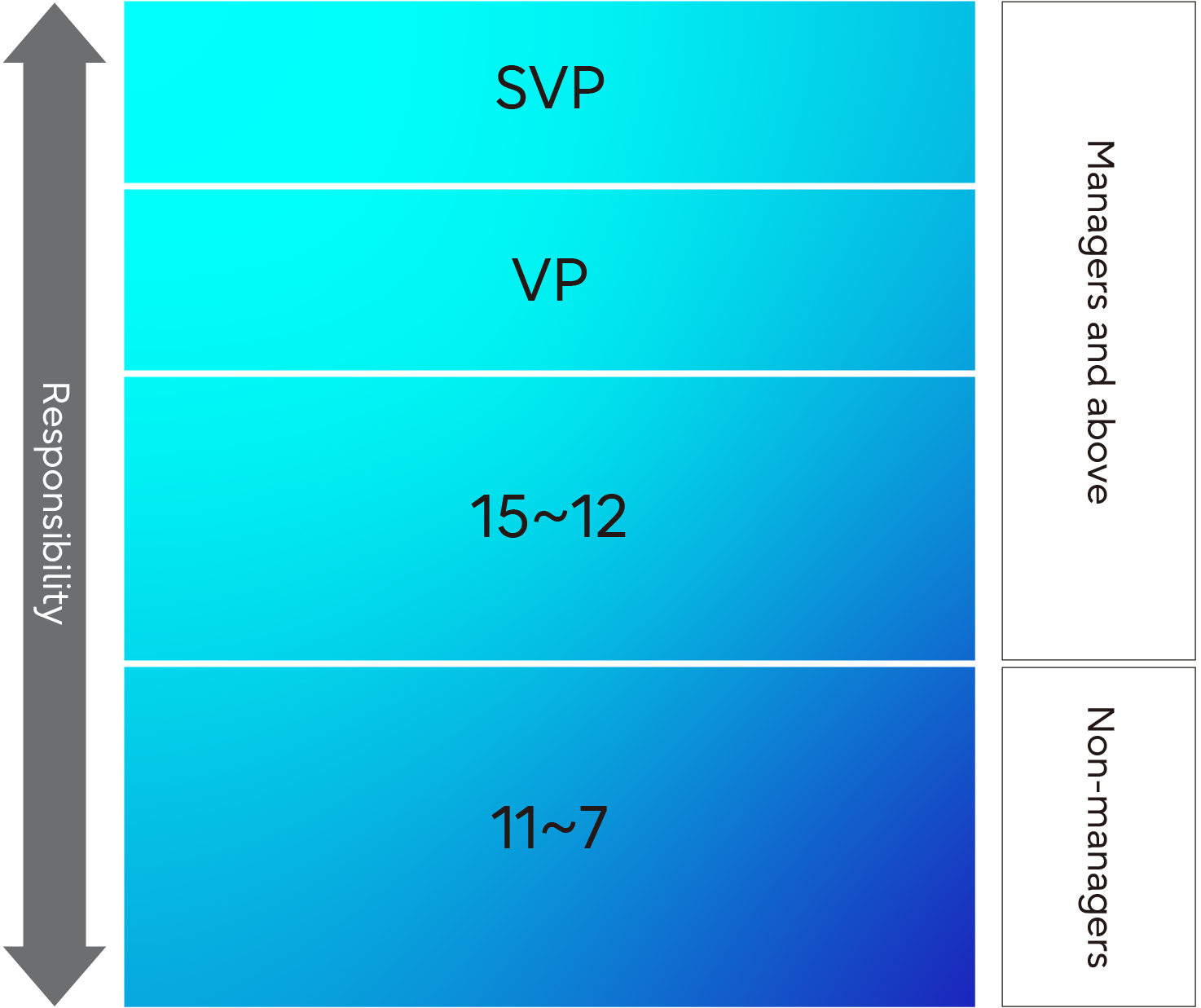 FUJITSU Level
FUJITSU Level
To achieve our purpose, the Fujitsu Group aims to be an organization that fosters innovation throughout society. We strive to quickly and agilely assemble our talented individuals from across the Group, united by a shared goal: to solve the challenges faced by our customers and society at large.
To foster "career ownership," where employees take on challenges and grow with their own motivation, and to achieve an organizational design and personnel placement system that aligns the right talent with the right positions based on our vision and strategy, the Fujitsu Group promotes Position-based HR Management as a global human resource platform. This initiative supports the growth and actions of each employee.
Within the HR System based on Position-based HR Management, we have established the “FUJITSU Levels”. This framework clearly defines the duties and staffing requirements of each job, classifying them based on their occupation and responsibility levels.
The FUJITSU Level framework determines the corresponding levels of remuneration. Bonuses are awarded based on evaluations for FUJITSU Level 15 positions and below.
For executive positions of FUJITSU Level VP and above, we are implementing an STI(*1)/LTI(*2) scheme that is more closely aligned with performance outcomes. This scheme will also apply to executives both in Japan and overseas.
Remuneration levels are set with the goal of attracting and retaining a diverse and talented workforce. These levels will be reviewed as needed to ensure competitiveness against global corporate benchmarks. For example, in April 2023, we increased the average monthly salary by approximately 10%. Future remuneration levels will be adjusted appropriately based on market fluctuations.
- (*1)Short Term Incentive: Remuneration set based on the level of achievement of one-year performance targets, etc.
- (*2)Long Term Incentive: Remuneration set based on the level of achievement of medium-to-long-term performance targets, etc.
Evaluation System for Driving Employees’ Independent Aspirations and Growth
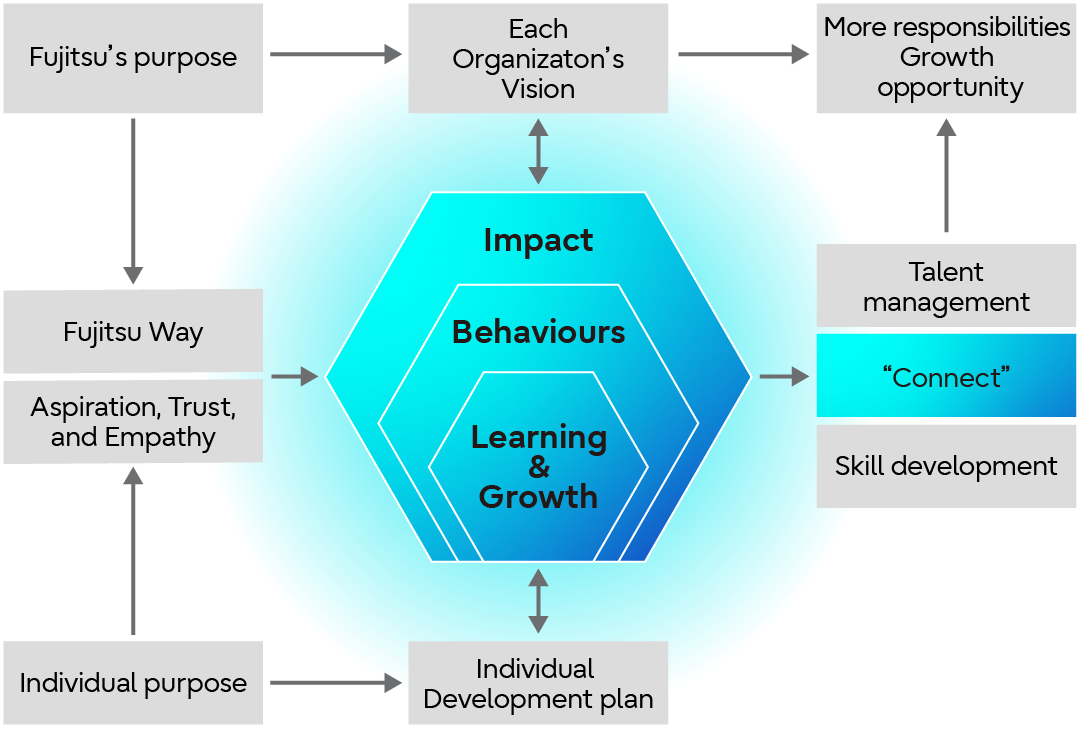
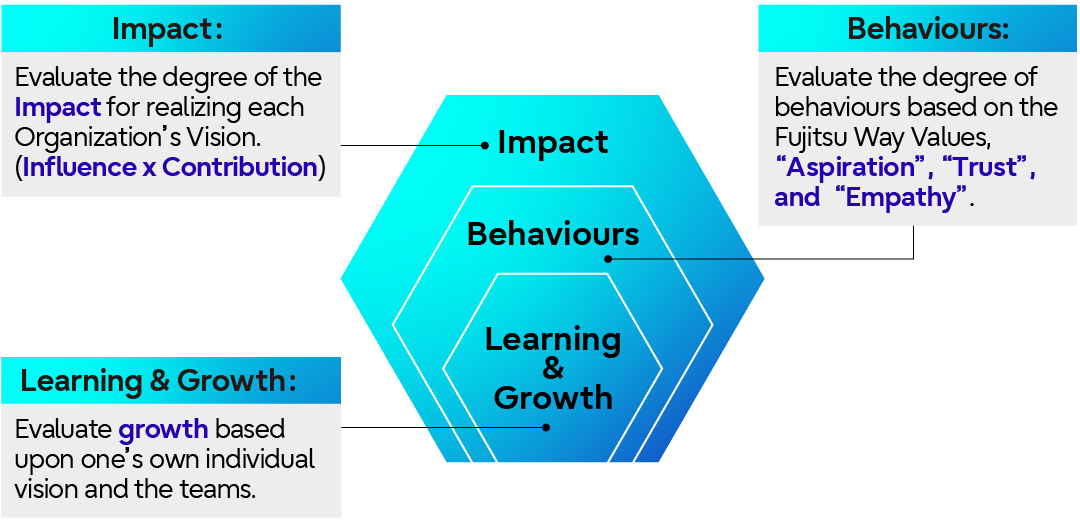
Fujitsu’s “Connect” global common evaluation system aims to align Fujitsu’s purpose with the individual aspirations of each employee. This alignment fosters individual growth and maximizes the impact on the organization, customers and society.
Connect features three key elements. The second element, in particular, involves regular one-on-one meetings between team members and managers. These meetings focus on providing feedback on individual performance reviews and future growth. Currently, these one-on-one meetings are held at least once a month for approximately 70% of our employees.
(1) Formulating focus area
“Focus area” represents the strategic policies and goals for each business period, aligning with Fujitsu’s Medium-term Management Plan and organizational vision.
Team’s focus area are established based on the team’s goal, and shared with all team members to maximize team performance.
Each individual’s focus are is formulated as a challenging goal, mutually agreed upon in the initial one-on-one meeting between a team member and a manager..
(2) Frequent one-on-one meetings
At least once per month, meetings are held between team members and managers to review recent performance and discuss future growth and career development.
Performance reviews extend beyond mere results management, providing employees with feedback on whether they are acting in accordance with their individual role based on the Fujitsu Group’s Code of Conduct, the Fujitsu Way.
Fujitsu highly values the realization of “Aspiration”, “Trust” and “Empathy” as the key values of the Fujitsu Way, which underpins Fujitsu’s medium- and long-term value structure. Accordingly, within the “Connect” system, employees are assessed on their “Impact”, “Behaviors” and “Learning & Growth” relative to achieving each organization’s vision and Fujitsu’s purpose. (See figure at right.) Additionally, to ensure comprehensive consideration during evaluations, “people discussions” are conducted within each organizational unit to discuss measures aimed at the future growth of each employee and to validate the evaluations.
(3) Using evaluations for remuneration, assignments and upskilling support
Using the evaluation results in considerations of remuneration, assignments and upskilling support enables us to create mechanisms that ensure consistent personnel management and maximize the growth both of individuals and the organization. This, in turn, can have a significant impact on the organization, customers and society at large.
Employee Benefits Program
The Fujitsu Group has programs in place that are suited to the lifestyles of employees and their families and are designed to enable them to achieve a sense of well-being.
As part of the trend toward more diverse and flexible ways of working, and to allow employees to make their own choices, Fujitsu introduced the ”F Life+” cafeteria plan(*3). In line with the belief that active work, challenges and personal growth for every employee will lead to growth and development for the company, we have established various incentives to provide medium- to long-term motivation. These include a defined contribution pension plan, an employee shareholding association, a property accumulation savings plan, and group insurance benefits. Additional programs implemented by Fujitsu provide support in the areas of housing, medical care, healthcare, and childcare and nursing.
- (*3)Cafeteria plan:
A system under which employees select the employee benefits they want or need from a diverse menu prepared by the company, taking advantage of the chosen options by using "employee benefits points" awarded by the company.
Key Initiatives in Regions Outside Japan
Financial Wellness Interactive Brochure in the Americas Region
We have created an interactive brochure on Financial Wellness for our employees in the Americas Region. This brochure provides helpful tips to enhance personal financial well-being, covering topics such as:
- Securing financial assets in a management account
- Taking stock of assets and liabilities
- Developing a long-term retirement savings plan
- Preparing for large and unexpected expenses
- Annual review of progress

Financial Coaching in the Europe Region
Lifesight, our primary UK Pension plan, has recently partnered with Octopus Money to offer one-on-one financial coaching to members. This service provides one free session with a financial coach, giving individuals the opportunity to:
- Ask any money-related questions
- Discuss financial goals for the future
- Build a step-by-step plan

Discount Service for Sporting Facilities in Europe
From February 2024, our new partnership with Urban Sports Club offers all employees in the Germany-Austria-Switzerland region discounted access to over 50 types of sporting activities at approximately 7,000 sports clubs. This service reduces the financial strain on employees by providing them with free or heavily discounted access to facilities such as yoga studios, bouldering gyms, fitness clubs and swimming pools.


